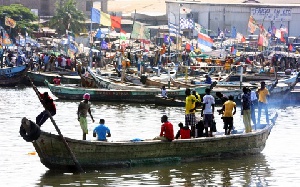A recent study has identified collisions between canoes and industrial fishing vessels as a threat to artisanal fishing in the country.
Funded by the EU under a three-year project, the study revealed most of these cases are recorded within the zones reserved for artisanal fishers (Inshore Exclusion Zone or IEZ).
According to the study, thousands of cases of industrial vessels destroying nets and canoes of artisanal fishermen at sea were recorded.
Yet only around 5 per cent of these cases were reported to the Fisheries Commission, and even fewer cases (around 1 per cent of the total) resulted in compensation for the losses incurred, the study revealed.
The fishers surveyed said they are often unable to bring claims in such cases due to difficulties identifying the offending vessel.
The findings of the study took centre stage Tuesday at a workshop in Cape Coast for stakehoders from the artisanal fishing sector. The EU-funded project is titled ‘Far Dwuma Nk?do, or Securing Sustainable Fisheries and was The study carried out by the ‘Far Dwuma Nk?do’ project partner, Hen Mpoano, and provided detailed insights into the challenges facing small scale fishers in Ghana today.
The ‘Hen Mpoano’ and the Environmental Justice Foundation (EJF), who are partnering on the project, brought together around 50 chief fishermen from across the Central Region, as well as representatives of fishers and fishmonger associations, to deliberate the findings of the study and ensure they represent accurately the picture on the ground.
The findings will form a baseline against which the Far Dwuma Nk?do project will measure the impact of its interventions over the coming years. The project is working to improve the lives of artisanal fisherfolk and help Ghana restore its dwindling fish stocks.
A fisherman, Daniel Ennien, recounted his experience at sea: “I went out for an expedition last week Monday dawn with my team and after setting our net a fishing vessel passed through our zone and destroyed it. “They are not just destroying our gears they are stealing the fish that belongs to those of us with the small canoes. Now I am jobless and I don’t know how I will manage to take care of my wife and children,” he added.
For him, the best compensation is “to take the vessel to the shrine and curse it to sink in the ocean because they are heartless”. Speaking at the workshop, Mr Antoine Rougier, who is coordinating the project on behalf of EJF, explained that a total of 44 fishing communities in the Central Region, and 15 fishing communities in the Volta river estuary in Ada, will benefit from activities under the project.
He indicated that the focus of the project’s interventions will be on vulnerable, disenfranchised fishermen and women who are considered to be most at risk of the impacts of illegal fishing and declining fish stocks.
“EJF and Hen Mpoano will support communities to document and report cases of industrial fishing vessels operating illegally in the IEZ reserved for traditional fishermen.
“This will include training communities in smartphone technologies to enable the gathering of visual evidence that can be shared with all stakeholders, and ensuring this is brought to the attention of the enforcement authorities”, he said.
On his part, Mr Balertey Gormey, Senior Program Officer at Hen Mpoano, highlighted the need to reinforce traditional mechanisms for fisheries management and enforcement.
“It is promising that most communities surveyed were keen to form voluntary committees with legal backing to fight illegal fishing that is heavily impacting catches in their fishing grounds.”
“Actions at the local level must be supplemented by effective and transparent action by the Ministry to combat illegal and destructive practices of the industrial fleet, and to ensure fishers are compensated for losses resulting from conflicts at sea. The Far Dwuma Nk?do project is ready to collaborate with the Ministry to address the challenges facing Ghana’s fishing sector,” he added.
Small scale fisheries contribute significantly to national GDP and employ 80% of fishers in the country but are under threat from competition with industrial vessels, and vast over-capacity in the fishing sector.
Populations of small pelagics have collapsed over the past 20 years, threatening the food security of the nation and the livelihoods of over 2 million people engaged, directly or indirectly, in the artisanal fishing sector.
Business News of Wednesday, 29 November 2017
Source: 3news.com













